Text
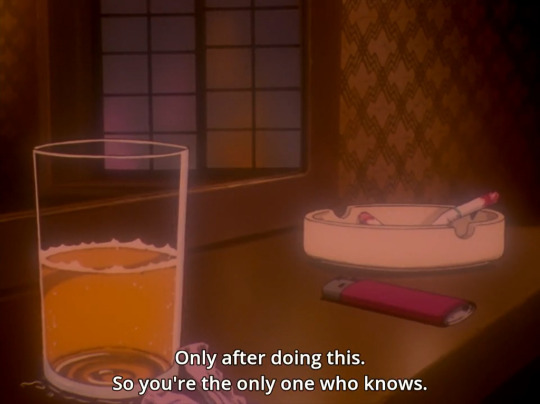
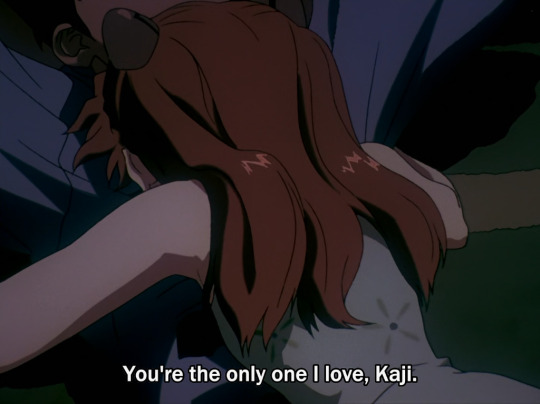
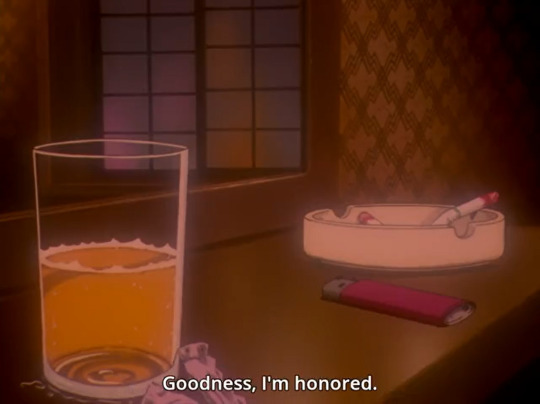
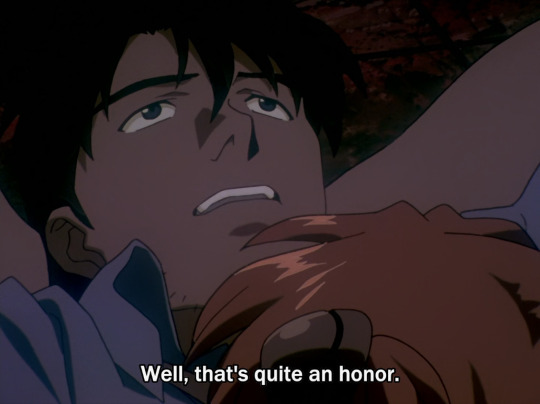
kaji and misato weaving a story, episode 20
kaji and asuka don't be, episode 22
225 notes
·
View notes
Text
I (unwisely) recently logged on to the website formerly known as Twitter, and was immediately greeted with more eva fandom misogynist apologia on the for you tab. Will this ever end?
Equating Shinji's misogynistic actions towards Asuka (and his more subtle misogyny towards Rei and Misato) to Asuka being rude and abrasive to Shinji is just absurd. Is Asuka rude? Yes. Does she have poor social skills? 100%. But Asuka is not a bully, period. Why? Bullying, like abuse, is about power structures. The only character more powerless than Asuka in this show is Rei. Asuka has no adults on her side. Misato favors Shinji because he reminds her of her father wound and neglects Asuka because she reminds her of the feminine parts of herself (read: her unhealthy interactions with men and boys, particularly Kaji and Shinji, which, ironically, stem from her father wound). Or have we forgotten about this scene? Similarly, once Kaji arrives in Japan, he also begins neglecting Asuka in favor of Shinji.
In addition to Shinji's mistreatment of her, Asuka's also experiencing culture shock (compounded by the fact that she's functionally illiterate in Japanese, since she canonically can't read kanji) and the fact that Kensuke was literally manufacturing and distributing csam material of her (and other girls!). Asuka also lacks the protective Eva Unit that Shinji benefits from at almost every turn. The only ally Asuka has is Hikari, who is an ordinary girl with no power over any of the things that are harming or have harmed Asuka.
The smoking gun here is the fact that Shinji is fantastically unfazed by Asuka (who, it must be said, makes several attempts to be kind to Shinji -- which he typically shuts down). Until eoe, the most emotion that he shows around her is when he's understandably upset that she moved into his room while he was at school, and even then he's not upset with Asuka, he's moreso upset at the situation. When he does finally get angry at her in eoe, it's because she was honest with him about how he hurts her and how she does not want to help him (to be clear: she's not obligated to).
Besides that, he nonchalantly tells her not to speak to him that way, or confesses to another character that he finds her bothersome or annoying. There is no real evidence that Asuka has any significant, negative impact on Shinji's psyche the way an actual bully would have on their victim; no, the characters who have the most negative impact on Shinji are Gendo, Yui, and Misato.
What empowers bullies of any age in real life is a power structure (be it at a school, workplace, or in the home) that is negligent towards the victim. There is a reason why school bullies tend to be star athletes, high academic achievers, or exceptionally well-liked (by students, staff, or both) students -- it's because these students often come from privileged backgrounds and/or are aligned with the power structure of the school. Power empowers, go figure.
Misato's treatment of Shinji is definitely not admirable (let's not forget that by the end of the series, Misato has assaulted Shinji); but it's not neglectful. She's very concerned with and involved with his inner life, albeit for selfish reasons. Conversely, Misato knows every ounce of Asuka's pain (rewatch the end of episode 10) and still neglects her! Keeping both Asuka and Shinji in the same household after episode 9 was a mistake on Misato's part. A good, competent caretaker would've discussed the issue (the nonconsensual kiss) with them both separately with the end result being one or both of them moving out into the dorm-like housing that NERV has.
Point being is that the power structure exclusively benefits Shinji relative to Asuka. Despite also suffering as a child soldier and a victim of trauma and abuse, he is privileged relative to Asuka due to how the adults who have power over him and Asuka favor him through their interactions.
Finally, eoe beats us over the head with how uncompassionate Shinji is towards Asuka, Rei, and Misato. Characters who just to happen to be...women and girls. Huh. How about that? It's almost like there's a message there. Although there are a few moments in the show where it's suggested that Shinji ought to empathize more with boys and men like Toji, Kaji, and Gendo (suggestions to empathize with Gendo tend to come from Rei in particular, which I'm not a huge fan of, for the record, but I also recognize that this is Rei imparting her own perspective regarding her own internal journey of questioning onto Shinji), the fact that in eoe, the piece that marks the end of the series, much of the narrative focuses on Shinji's treatment of the women and girls in his life is absolutely significant and sends a message about misogyny.
Does being a misogynist make Shinji a horrible, irredeemable character? Well, that's up to each viewer to decide. My take is that he can still break the cycle and improve. Any story about childhood trauma and abuse would be incomplete without at least one of the characters going down the road of turning into an abuser and/or their traumatizer -- Shinji fits this bill in eva, same with Misato and Ritsuko. Despite everything, I like Shinji. I find him endearing and even identify with him to a certain degree.
When you ignore these facts about Shinji's character, you are erasing a large, very interesting part of his character. Reducing him down to any flavor of sensitive, soft boy is as boring as it is cliche after the more than a quarter of a century since the first episode aired in 1995.
The softness, the sensitivity -- this is Shinji's exterior. Beneath it lies someone who is selfish, callous, bitter, rude, and self-flagellating. As is the case with every eva character, the interior is more interesting than the exterior.
The thing is that everything I've discussed in this post isn't just some throwaway line or a piece of blink and you'll miss it symbolism. It's present in this show basically from episode 1 onward. Seriously, rewatch episodes 1-7. Shinji clearly has some misogynistic ideas about how women should be and this rubs off on how he thinks of Misato (and Rei!), especially regarding how women should dress, keep house, and interact with their sexuality. He not uncommonly makes jabs at Misato for being a slob and having poor dating prospects. After Asuka arrives, much of this is transferred to her.
If anything I've written here sounds like vilification to you, I'd encourage you to examine why. For better or worse, this is the reality of eva and Shinji as a character. Will you face this reality, or just keep on dreaming?
#originals#shinji ikari#asuka langley soryu#nge#neon genesis evangelion#end of eva#eoe#end of evangelion
56 notes
·
View notes
Text
Saw eoe in theaters a week ago. Thoroughly enjoyed it.
13 notes
·
View notes
Note
Tal vez suene exagerado pero por alguna razón me molesta y perturba la sexualización excesiva hacia Rei Ayanami junto con la cantidad excesiva de personajes expy que son solo un fetiche de chica sumisa para los otakus extremistas. ¿No se supone que Rei era una crítica hacia esa clase de waifus?
¡Hola!
Gracias por la pregunta (y por recordarme que necesito practicar el subjuntivo más). He oído esta idea. El problema con esta idea es que Eva es responsable de mucha de la cultura moderna de otakus. La cultura moderna de otakus es cuando el concepto de waifus emerge verdaderamente y así que es difícil de discutir que Rei era una crítica de waifus, aunque waifus existieron antes de Eva, Eva (y unos otros animes) creó waifus como las conocemos hoy. Anno, Sadamoto, Hayashibara, etc. nunca han dicho nada de Rei siendo una crítica, así que no creo que esta idea es cierta. Parece que esta idea sea de Evageeks, un foro que es el origen de muchos mitos de Eva, irónicamente. ¡Pero puedes interpretar el texto en esa manera, por supuesto, porque Eva es un texto muy rico!
Mi otro pensamiento es que Rei no es sexualizada (las veces cuando está desnuda son intentadas ser inquietantes y demuestran que Rei es una víctima del abuso) en el anime original (aunque los rebuilds son otra historia). Pero tienes razón que los expys de Rei son sexualidados y este hecho es muy preocupante porque dice mucho de nuestra sociedad y cómo ve mujeres y chicas. La idea de una chica sumisa no existe en un vacío. Obviamente hace un gesto a ideas misóginas de cómo mujeres y chicas deben ser y este hecho es porque este tipo de personaje es tan popular. Hay mucho ser dicho de Rei y su influencia en la industria de anime, y este sólo es la punta del iceberg.
¡Espero que mi respuesta sea comprensible, jajaja!
6 notes
·
View notes
Text
For anyone who still cares about vaporwave in 2024, I made a sample-heavy vaporwave album inspired by Eva. I make no claims that it's good or innovative, but I had fun making it. Find it on bandcamp here.

55 notes
·
View notes
Text
Just dropping in to say that if you have ever complained about how any of the teenagers in eva are annoying, you are weak and would not survive working with actual irl middle school students. The eva teens should actually be MORE annoying for maximum accuracy.
22 notes
·
View notes
Text
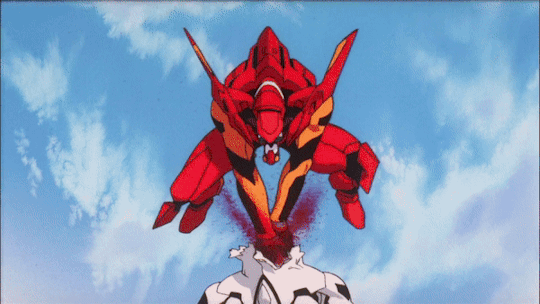

Unit 02 in The End of Evangelion (1997)
Unit 08 in Evangelion: 3.0+1.0 Thrice Upon A Time (2021)
#originals#asuka langley soryu#mari makinami illustrious#eoe#end of eva#evangelion#neon genesis evangelion#thrice upon a time#rebuild of evangelion#roe
37 notes
·
View notes
Text
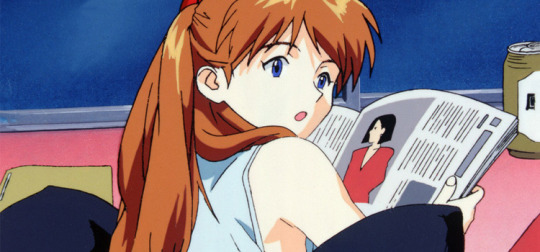
literary references in evangelion
toji suzuhara, kensuke aida, and the last name horaki are lifted from characters within ryu murakami's novel ai to gensou no fascism / fascism of love and illusion.

nerv's motto is a quote from pippa passes, a 1841 verse drama.
"God's in his heaven— All's right with the world!
this line is also quoted in anne of the green grables.
"'God's in his heaven, all's right with the world,'" whispered Anne softly.
isao takahata's anime adaptation anne of the green gables also includes a scene similar to the ending scene of the anime series.
the name of episode 26 (the beast that shouted i at the heart of the world) is a reference to the book by harlan ellison, the beast that shouted love at the heart of the world, a collection of short stories. "i" sounds very similar to "ai", meaning love in japanese.
the greek tragedies, oedipus rex and electra which is fairly self-explanatory... i hope... with the show's use of freudian concepts (shinji's oedipus complex and misato's electra complex respectively.)

the human instrumentality project is a reference to the book series by cordwainer smith, instrumentality of mankind.
despite that, the human instrumentality bears a striking resemblance to the plot of Arthur C. Clarke's 1953 novel, childhood's end.
plot synopsis on goodreads:
The Overlords appeared suddenly over every city--intellectually, technologically, and militarily superior to humankind. Benevolent, they made few demands: unify earth, eliminate poverty, and end war. With little rebellion, humankind agreed, and a golden age began.
But at what cost? With the advent of peace, man ceases to strive for creative greatness, and a malaise settles over the human race. To those who resist, it becomes evident that the Overlords have an agenda of their own. As civilization approaches the crossroads, will the Overlords spell the end for humankind . . . or the beginning?
in asuka and kaji's introductory episode asuka strikes, there are four battleships in the UN convoy named after the shakespeare plays titus andronicus, cymbeline, othello and tempest.

in 2.22, kaji says he feels like urashima taro, referencing the japanese legend named after it's titular character, a fisherman named urashima taro. the legend goes that the fisherman rescues a turtle and is rewarded by a visit to the dragon palace where he is entertained for several days but when he returns to the human world, he finds that he had been gone for at least a century and everything around him has now changed. this is a metaphor for how kaji left tokyo-03 for only two years yet feels as though everything around him has now changed.
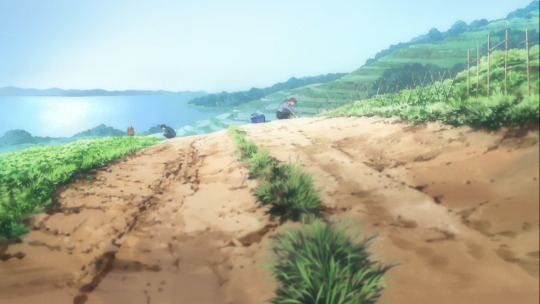
episode sixteen being titled (there are alternate titles to several evangelion episodes) sickness unto death after the philosopher soren kierkegaard's book of the same name exploring christian existentialism.
speaking of episodes being titled after philosophical works from the victorian era, is the hedgehog's dilemma. originally described in arthur schopenhauer's collection of philosophical reflections, parerga und paralipomena. the hedgehogs dilemma is a theme seen over and over again in evangelion with episode 4 being titled after it.
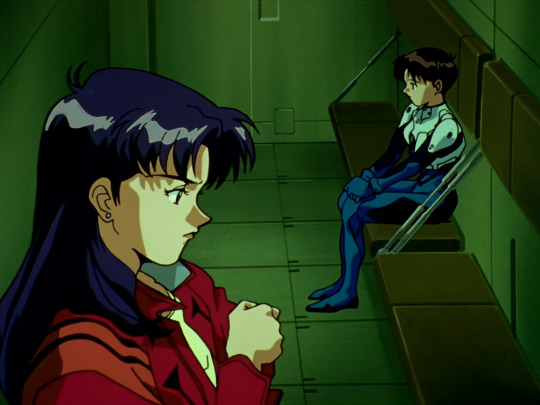
the title of evangelion 3.0 + 1.0: thrice upon a time references the book with the same title, thrice upon a time by james p. hogan.
It's amazing enough when Murdoch Ross's brilliant grandfather invents a machine that can send messages to itself in the past or the future. But when signals begin to arrive without being sent, Murdoch realizes that every action he takes changes the future that would have been...and that the world he lives in has already been altered!
Then a new message arrives from the future: The world is doomed!
as qmisato pointed out, anno has referenced james p. hogan's works previously as well (nadia: secret of the waters' final episode being titled inheritor of stars referencing hogan's novel inherit the stars)
565 notes
·
View notes
Text
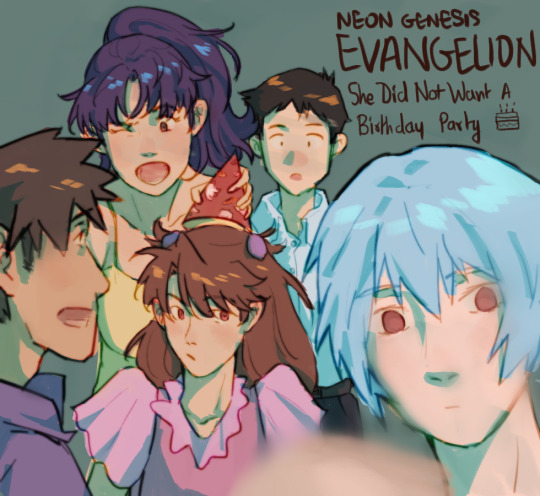
listen,,,, i wasn't done
424 notes
·
View notes
Text

purpose
286 notes
·
View notes
Text

54 notes
·
View notes
Text
Read Jeff Kass' Columbine: A True Crime Story the other day (this is the best, most factual English-language book on the subject; Cullen's book is basically his fanfic in many respects), and came across this interesting bit:
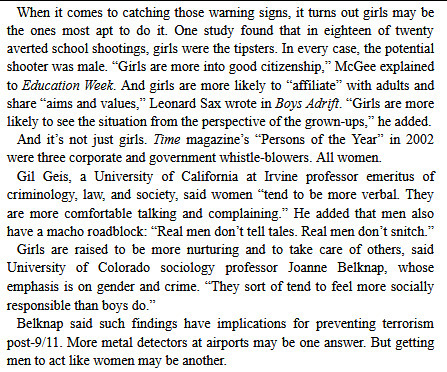
The context is that Kass is discussing why it is that girls are more likely to spot warning signs of school shooters (gender is such a huge component of this problem, yet there is so little discussion of it, so I really respect Kass for even including this brief bit in his book).
Since then, I've been thinking about this concept of feminine social responsibility in a more general sense and how it relates to the Eva women.
Ritsuko pays no mind to questions of right and wrong. She facilitates Third Impact with impartiality and only attempts to thwarts it to hurt Gendo after she decides the events of episode 23 are the last straw. Ritsuko reveals the truth of Rei, all the cruelty and all the facade, to Misato and Shinji for her own personal catharsis -- not for Rei or anyone else's material benefit. Not even her own, really, since this results in Gendo putting her in what basically amounts to solitary confinement. The most "responsible" thing Ritsuko does in the series is probably chastising Misato for her off-color and concerning jokes about SA towards Shinji in episode 2, but even that feels like a slap in the face after finding out her complicity in Gendo's abuse of Rei. Ritsuko knows she's doing ~bad~ things and loses no sleep over it until she can no longer deny that she's been hurt by this arrangement, and even then, the morals aren't her concern -- only that she can no longer bury this pain.
Naoko fits into this in much the same way -- her research into Rei mirror's Misato's research, yet Naoko ultimately copes with the suspicion that something is amiss in the same way that Ritsuko copes with the certainty and acceptance that there is -- by killing Rei. Naoko's interaction with Rei is, fittingly, much more personal -- Naoko kills with her bare hands; Ritsuko does so with the push of a button. Additionally, there's not really anything to suggest that Naoko was planning on doing anything with her information on Rei -- the murder was committed on impulse. If Ritsuko does an arguably materially good act for selfish reasons, then Naoko does a needlessly cruel act for selfish reasons. This situation is less nuanced.
Maya probably showcases this feminine social responsibility the most out of the Eva women -- she stands up to Gendo and tries to police Ritsuko in much the same way that Misato and Ritsuko try to police each other. Cracks begin to form for Maya, too, but she resigns herself to continue going with the program, unlike Misato, who is at least genuinely curious and does her own independent research.
Misato is hawkish and, much like Maya, wholeheartedly believes that NERV is a net positive for the world. But when Kaji reveals the Adam-Lilith switcharoo in episode 15, Misato's worldview begins to crack. Yet she quietly sits on this information, barely discussing it with Kaji. Her most significant interactions regarding this are with Ritsuko, whom she batters over these doubts as she refuses to accept partial blame for Shinji's potential demise in episode 16. Misato's ego is bruised by Kaji's revelation to her, because it pokes holes in the myth that fuels her life's purpose. Ultimately, the concern boomerangs back to Misato herself, rather than the pilots or the millions of people around the world who are starving because governments' budgets are drained from supporting NERV. The difference between Misato and Ritsuko is that Ritsuko is under no impression that she's "good." Misato is.
Now we come to Yui. Like Naoko, her actions are really only to fuel her own desires and ego -- Misato and Ritsuko are more nuanced than Naoko and Yui. Yui waxes poetic about the moon, stars, happiness, etc. but ultimately...her master plan was not concocted for any noble reason, but rather, to serve herself.
Kaji, interestingly, does display social responsibility. He tells Misato the truth about Adam/Lilith out of the goodness of his heart; not for any ulterior motive. His research and status as a triple agent stems from his genuine desire for the truth. Unlike Misato, his worldview is not based on either side of the coin. Unlike Ritsuko, Kaji is actively trying to thwart the wrongs he's forced to do as part of his job, and it costs him his life. This is not the only time that Kaji is assigned a typically feminine role/trait/status, etc.
I have not discussed Asuka and Rei here for a few reasons. One is that their responsibilities are less nuanced (though significantly heavier in many ways) than that of the women -- which makes sense, being that they're teenagers. Another reason is that, unlike Yui, Naoko, Maya, Ritsuko, and Misato, Asuka and Rei never commit any grave wrongdoings throughout the series. At worst they are a little annoying or slightly rude.
#originals#nge#neon genesis evangelion#evangelion#eva#eoe#end of eva#end of evangelion#ritsuko akagi#maya ibuki#misato katsuragi#naoko akagi#yui ikari#ryoji kaji#ask to tag
65 notes
·
View notes
Text
The state of eva analysis on this site is such shit that I have to make a comeback soon.
35 notes
·
View notes
Text
(cw: discussion of abuse)
What’s weird about clones in science fiction is that most writers seem to have this very strange belief (which is widespread in real life too) that there seems to be a limited number of “souls” and thus a cloned being is “souless”. Not only that does not make sense in real life (are test-tube babies souless? are twins souless?) but it conflicts with my belief on human nature (and souls, I guess). Even if a clone is a 100% accurate genetic copy, the experiences, the feelings, the thoughts, are different, because those aren’t saved in DNA; they are a result of our interaction with the world and other people. I don’t know where a new individual starts or begins, but I know for sure that a clone of me wouldn’t be me; he would be a new being, and most importantly, he would be a person, a person created differently but a person nevertheless, with all that implies.
One example I’ve been thinking of is Rei from Neon Genesis Evangelion. She’s treated as a plot device by the writers (Anno himself said that he straight up forgot about Rei after the battle with Ramiel) and the fans tend to analyze her by her importance, again, as a Plot Device and her origin as a clone. She’s the clone of Yui, she has the soul of Lilith, she has a lot of clones that are involved in the esoteric projects of NERV, etc. etc. She’s somber and silent and weird because she’s a Souless Clone… or rather a powerful being with a messed-up soul, whatever: the point is, Rei is Like That because she’s a Clone and clones are “evil”.
But the thing is, if you see Rei as what she was: a traumatized 14-years old girl, the clone thing doesn’t really matter. Rei isn’t somber, obedient and silent because she’s a clone with a messed-up soul, she’s like that because she’s been raised in a sterile, downright cruel and distressing enviroment where Gendo uses (and abuses, seriously, that isn’t even subtext) her for his own purposes. No kid raised in the kind of conditions that the show explictily tell us would turn out ‘okay’.
And yet, Rei feels. She thinks, she does things on her own. She doesn’t know how to live a normal life, but she tries. When exposed to people like Shinji, when exposed to a normal life, she slowly breaks from her abusive conditioning and realizes she could be something else. The whole “ideal fantasy world” sequence on the final episode of NGE shows us that she *could* have been a normal, happy girl if raised normally. She’s not like that in the series not because she has the soul of an ancestral alien being, she’s like that because she has endured a lifetime of abuse.
Now, that isn’t news to anybody, most NGE fans know that Gendo is an abusive asshole. And yet Rei is treated in fan-discussions, again, simply as a plot device with no mind or will of her own. The other characters have complex psychological explanations for how they act and what they do; except for Rei. She does stuff because she’s a clone made up with messed up esoteric science and that’s it. If she did or think or say something important, that was Yui, or Lilith, not her. There’s no consideration on how all the extremely distressing enviroment where she was raised would affect her as what she actually was: a person, a human being.
And that brings me to my main problem on how cloning and genetic modification are portrayed in fiction. Leaving aside for a moment that in NGE they have a very supernatural and esoteric component, cloning and genetic modification are portrayed as evil on themselves, and the results: clones, genetic modified organisms, ‘superhumans’, mutants, and so on, are portrayed as evil, uncanny or just downright wrong because of the way they were born, and little to no blame or even consideration is given to the people and society that created them, that treats human beings as tools and consider them soulless.
For many science fiction writers and fans, the clone is the evil one, not the society that brought them up and said “we made you, you are not like us, now do what we want you to do, but we’ll hate you nevertheless”. And believe it or not, that kind of thinking is quite widespread in real life. The fears of GMOs or cloning often aren’t based on real moral dilemmas and problems, but rather the ‘unnaturalness’ of it.
For all I know I could be a clone of someone. Would that matter? No, because I was raised by a family that, while flawed, cared and cares for me. Were I raised as a living weapon and abused constantly in a reclusive, horrible enviroment, and rejected by society because of it, I would be extremely traumatized, no matter if I was a clone or a “““normal”““ human.
The monsters aren’t the clones. The monsters are the people who think that other people, by the condition of their birth, are monsters.
851 notes
·
View notes
Text
visual storytelling in nge: asuka's name
there are three different asukas we get to see in canon.
asuka langley soryu from the original anime, asuka shikinami langley, and a rare glimpse of asuka langley soryu from the alternate universe (episode 26).
note that both the original soryu and shikinami's names are shown to be written in katakana (on id cards, text on screen, etc).
in the alternate universe only, her name is written in kanji as 明日香 (shown scribbled out on the desk).

77 notes
·
View notes
Text
Something I've been obsessed with during this rewatch is how the narrative allows -- or does not allow -- characters to get even with each other. Especially how Asuka and Rei are allowed to get even with Shinji.
I just now noticed how these two scenes from episodes 5 and 6 parallel each other.
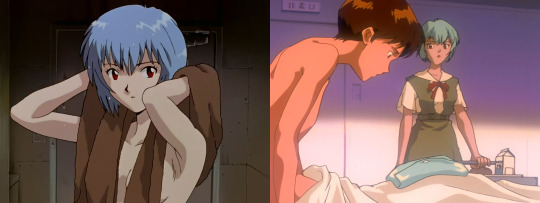
One party comes into the other's space with no knock on orders from an adult to deliver something important to her, and there's the accidental witnessing of the other party with no clothes on. The same thing happens in the very next episode, albeit with the roles reversed. Obviously, the scene from episode 5 is much more charged and has many more layers than the one from episode 6. But Rei is allowed to get even with Shinji.
Compare to Shinji and Asuka's relationship.

For what it's worth, I genuinely believe Shinji didn't know Asuka was changing here. I don't think he meant to peep on her here. However, in the very next episode, we have these 2 scenes:

(Sidenote: why on EARTH did they draw the frame on the right to where it looks like Asuka got back alley implants!!!)
Where, again, there's one-sided accidental nudity. This time, Shinji intentionally looks at and attempts to touch Asuka in a not-very-friendly way.
But Asuka is not allowed to get even with Shinji -- at her worst, she's mildly annoying to him. If she was anything more than that, the infamous hell kitchen scene and the entitlement he shows in it wouldn't've happened in eoe.
I suppose you could argue that Asuka making Shinji wear her plugsuit in episode 8 counts as getting even, but I don't count it because even then, the score is 1-3. Additionally, when they're fighting the angel later in the episode, the writing unambiguously clowns on Asuka for being overconfident and praises Shinji for paying attention to key details (that Unit 02 didn't have to right equipment for underwater combat).
Shinji is allowed to make a mistake (accidentally peeping) with no consequences, but Asuka's mistake (sleepwalking) is punished.
189 notes
·
View notes
Text
Something I've been obsessed with during this rewatch is how the narrative allows -- or does not allow -- characters to get even with each other. Especially how Asuka and Rei are allowed to get even with Shinji.
I just now noticed how these two scenes from episodes 5 and 6 parallel each other.

One party comes into the other's space with no knock on orders from an adult to deliver something important to her, and there's the accidental witnessing of the other party with no clothes on. The same thing happens in the very next episode, albeit with the roles reversed. Obviously, the scene from episode 5 is much more charged and has many more layers than the one from episode 6. But Rei is allowed to get even with Shinji.
Compare to Shinji and Asuka's relationship.

For what it's worth, I genuinely believe Shinji didn't know Asuka was changing here. I don't think he meant to peep on her here. However, in the very next episode, we have these 2 scenes:

(Sidenote: why on EARTH did they draw the frame on the right to where it looks like Asuka got back alley implants!!!)
Where, again, there's one-sided accidental nudity. This time, Shinji intentionally looks at and attempts to touch Asuka in a not-very-friendly way.
But Asuka is not allowed to get even with Shinji -- at her worst, she's mildly annoying to him. If she was anything more than that, the infamous hell kitchen scene and the entitlement he shows in it wouldn't've happened in eoe.
I suppose you could argue that Asuka making Shinji wear her plugsuit in episode 8 counts as getting even, but I don't count it because even then, the score is 1-3. Additionally, when they're fighting the angel later in the episode, the writing unambiguously clowns on Asuka for being overconfident and praises Shinji for paying attention to key details (that Unit 02 didn't have to right equipment for underwater combat).
Shinji is allowed to make a mistake (accidentally peeping) with no consequences, but Asuka's mistake (sleepwalking) is punished.
189 notes
·
View notes